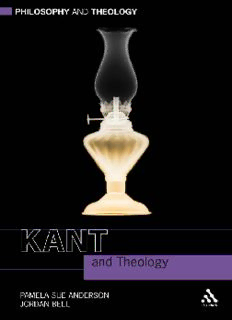
Kant and Theology (Philosophy and Theology) PDF
Preview Kant and Theology (Philosophy and Theology)
Kant and Theology Other titles in the Philosophy and Theology series include: Zizek and Theology, Adam Kotsko Nietzsche and Theology, Craig Hovey Girard and Theology, Michael Kirwan Wittgenstein and Theology, Tim Labron Hegel and Theology, Martin J. De Nys Derrida and Theology, Steven Shakespeare Badiou and Theology, Frederiek Depoortere Vattimo and Theology, Thomas G. Guarino Kant and Theology Pamela Sue Anderson and Jordan Bell Published by T&T Clark International A Continuum Imprint The Tower Building, 11 York Road, London SE1 7NX 80 Maiden Lane, Suite 704, New York, NY 10038 www.continuumbooks.com All rights reserved. No part of this publication may be reproduced or transmitted in any form or by any means, electronic or mechanical, including photocopying, recording or any information storage or retrieval system, without permission in writing from the publishers. Copyright © Pamela Sue Anderson, Jordan Bell, 2010 Pamela Sue Anderson and Jordan Bell have asserted their right under the Copyright, Designs and Patents Act, 1988, to be identified as the Author of this work. British Library Cataloguing-in-Publication Data A catalogue record for this book is available from the British Library ISBN 13: 978-0-567-03414-4 (Hardback) 978-0-567-03415-1 (Paperback) Typeset by Newgen Imaging Systems Pvt Ltd, Chennai, India Printed and bound in Great Britain by the MPG Books Group [Kant’s] island1 . . . dates from the eighteenth century, and marks an epoch: philosophers had previously been in the habit of offering us more joyful and directly desirable things at the end of the path of knowledge – holding out in their discourse a prospect of islands to which we might more happily transport ourselves. In considering then, the historical singularity of the Kantian island, one should also not forget the historical situation . . . of a dated historical formation which strives to think . . . on questions which are those of an epoch, and of a social category . . . . . .[an] ancient happiness is no longer thinkable in the eighteenth century, as Kant does not fail to acknowledge, closing the Critique of Pure Reason, for example, with some thoughts on nature as cruel stepmother, and on the veneration we owe the creator ‘as much for what he has refused us as for what he has given us in recompense’. . . [the first Critique] points in this direction, but at the same time its metaphor annuls this and organizes a seduction into renunciation by depicting an island already discovered . . . A restoration of paradise on earth, through the work and progress of the . . . sciences, is declared possible and even already begun, despite and notwithstanding everything – even if the system cannot found this hope on reason. But without this hope, can there be a Critique of Pure Reason?2 This page intentionally left blank Contents Preface ix Introduction Kant: His Life and Theology 1 1 Themes from Transcendental Idealism 11 Introducing Kant’s Critique of Pure Reason 11 The Problem of Metaphysics 13 Transcendental Idealism 17 From Theoretical Reason to Practical Reason 21 2 ‘Moral Religion’ for Theologians 27 Kant’s Morality: The Second Critique and the Groundwork 27 Practical Reasoning, Freedom and Autonomy: Critical Distinctions 35 3 Theoretical and Practical Arguments for Theism 47 The Concept and Existence of God 47 The Speculative Proofs: A Critique of Pure Theoretical Reason 49 Kant’s Moral Argument: Belief in Practical Reason 55 Conclusion: On the Proofs for Theists 57 4 Immortality, Corruption/‘Radical Evil’ and Salvation 59 Religion as Shared Rationality versus Religion as Service to God 59 Rationality and Immortality: Working towards Salvation by Way of Moral Certainty 61 vii Contents Corruption and Freedom: ‘Is heaven our kind of place?’ 67 Christ and Human Salvation 70 Conclusion Critical Reception of Kantian Autonomy: Or, A Lesson for Theologians 75 Obstacles to Kant: Autonomy as Sinful and Masculine Pride 75 Theologians against Autonomy: Learning a Lesson from Feminist Reformers 77 Kant’s Philosophical Contribution to Theological Hermeneutics 82 Conclusion 86 Notes 89 Bibliography 107 Index 117 viii Preface Kant and Theology by Pamela Sue Anderson and Jordan Bell The philosophy of Kant is widely acknowledged to have had a major impact on theology. However, due to the vastness and complexity of Kant’s philosophical system, contemporary theo- logians and ethicists tend to steer clear of his actual writings and often exhibit a misunderstanding of his central ideas on reason, morality and religion. Anderson and Bell aim to make Kant accessible again to new generations of students and to challenge twenty-first-century academics to return to Enlightenment rationality. Kant and Theology takes a fresh look at freedom, evil and human autonomy in Kant’s Critique of Pure Reason, Ground- work of the Metaphysics of Morals and Critique of Practical Reason, as well as his Religion Within the Boundaries of Mere Reason and ‘An Answer to the Question: What is Enlightenment?’, demonstrating how these core texts can inform debates about a range of topics including salvation, heaven, ritual practices and the role of reason for religious people today. Teachers of theology, philosophy of reli- gion, ethics and feminist philosophy will find novel insights for solving practical and theoretical disputes over what place human agents and ‘moral religion’ have in a world shaped by ever-new scientific and cross-cultural advances. This book in the Philosophy for Theologians series includes a selective biography of Kant’s life and theology, four main chapters and a conclusion focusing on critical reception of Kant. The authors of Kant and Theology offer two acknowledgements. First, they would like to thank the Oxford philosopher A. W. Moore ix
Description: